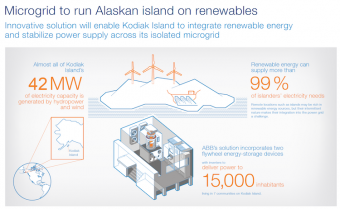 Low-carbon microgrids have assumed a place in the strategic agendas of some of the world’s largest power and industrial engineering corporations. That includes Swedish-Swiss ABB, whose roots in the now fast moving microgrid market segment date back some 25 to 30 years.
Low-carbon microgrids have assumed a place in the strategic agendas of some of the world’s largest power and industrial engineering corporations. That includes Swedish-Swiss ABB, whose roots in the now fast moving microgrid market segment date back some 25 to 30 years.
ABB has adopted a flexible, customer-driven approach as it marshals its resources and expertise in order to capitalize on growing renewable and hybrid microgrid opportunities, a trend that is now global in scope, Maxine Ghavi, ABB’s global director, microgrids, told Renewable Energy World.
“The drivers are different in different regions and among different types of customers,” she said. “It could be resilience, energy security; reducing costs, environmental impacts or reducing reliance on diesel fuel; or providing energy access — the drivers in play in specific markets and situations are multi-polar.”
Flexibility, Standardization and High Performance
The flexibility to integrate a full range of renewable energy generation sources — solar, wind, hydro or biomass — and integrate it with battery technologies such as lithium-ion (LiB) and adaptive intelligent system monitoring and controls are the main facets of ABB’s Power Store microgrid platform.
The fact that PowerStore is containerized and modular, as well as scalable, quick to deploy and engineered using proven, industry standard equipment and technology are other key features, according to Ghavi.
ABB has deployed more than 30 microgrids worldwide to date, and it’s in the midst of deploying them worldwide across its own fleet of manufacturing facilities. That includes announcing a project at its largest manufacturing facility in India, and one already up and running in Johannesburg, South Africa. The initiative is a core aspect of management’s plans to reduce the organization’s carbon and environmental footprints, energy consumption and costs, as well as ensure quality uninterruptible power, Ghavi said.
ABB’s microgrid platform, products and services also provide an opportunity to implement and demonstrate the benefits of ABB’s “Internet of Things, Services & People” strategy, she noted.
Encouraging Results
Tapping into local emissions-free renewable energy resources, making use of advanced LiB systems and using adaptive, intelligent system controls to balance power production, storage, dispatch and consumer load is producing encouraging results, both for customers and ABB itself, Ghavi and Bob Stojanovic, ABB’s Americas’ regional director for microgrids, told Renewable Energy World.
ABB’s microgrid group has played a seminal role in Alaska’s emergence as a leading-edge market for remote hybrid microgrids.
“There was a confluence of events there that created what turned out to be quite a successful situation,” Stojanovic said.
Having determined that the advanced lead-acid batteries originally installed were degrading too fast, ABB’s microgrid group designed and replaced them with an instance of PowerStore that included flywheel energy storage technology for rapid, high-power ramp-up capacity. That has enhanced the overall performance, as well as scope, of the Kodiak Island 9-MW hybrid wind and diesel-powered microgrid in Alaska.
With 2 MWs of LiB capacity serving as a buffer, the microgrid is also able to strike a balance between energy storage and dispatch with the large load required by a newly installed 3 MW electric harbor crane.
Source: renewableenergyworld.com

